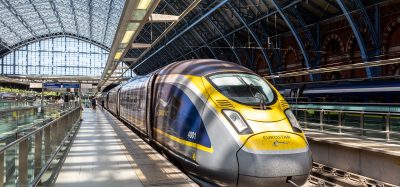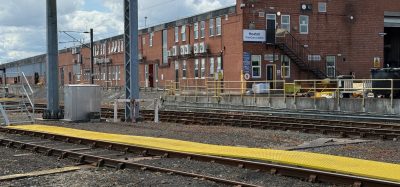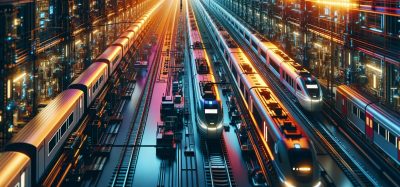Metro Trains Melbourne: On track to a sustainable future
Posted: 23 April 2020 | Raymond O'Flaherty | No comments yet
For Global Railway Review’s ‘Improving Rail’s Environmental Impact’ series, CEO of Metro Trains Melbourne, Raymond O’Flaherty, discusses how the operator is driving best-practice and innovation to achieve its sustainability outcomes.
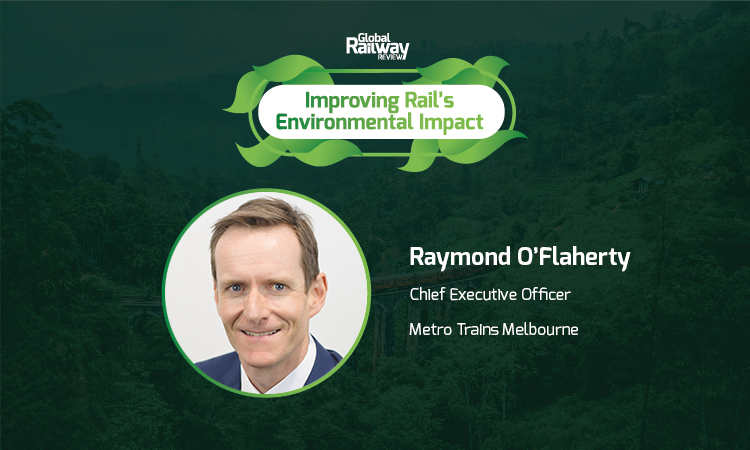

Melbourne is a global city with a rapidly growing population. More people than ever are turning to public transport to get where they need to go.
Metro Trains Melbourne (Metro) moves more than 800,000 people every day on a network spanning more than 1,000km of track and 222 stations. With more than 15,000 weekly services, we connect millions of people to their communities and are a fixture in their daily lives.
As we keep Melbourne moving, the city’s rail network is undergoing an exciting transformation, with unprecedented investment by the Government of Victoria in major city-shaping transport projects.
This transformation means that even more people will choose train travel in the future, particularly as Melbourne is predicted to overtake Sydney as Australia’s most populated city.
As we keep Melbourne moving, the city’s rail network is undergoing an exciting transformation, with unprecedented investment by the Government of Victoria in major city-shaping transport projects.
This increasing demand on train travel comes at a time of developing public consciousness and concern regarding climate change, particularly as Australia recovers from some of the worst bushfires in the nation’s history.
During this period of growth, rail operators are being challenged to do things differently; to not only address climate change, but also recycling, water, energy use and social inequality. That means supporting the local environments touched by our network, helping people from a diverse range of backgrounds into employment and making sustainable choices about the materials we use to maintain our trains and equipment. To do this, we need to address the needs of everyone impacted by our operations; from employees, passengers and communities to contractors, partners and suppliers.
At Metro, we recognise the enormity of this challenge – and we’re rising to it.
In 2019, we proudly released Metro’s first Corporate Responsibility & Sustainability Report, outlining key objectives and initiatives across several key pillars. These include social responsibility, environmental sustainability and economic prosperity. Significant strides have already been made in many of these areas.
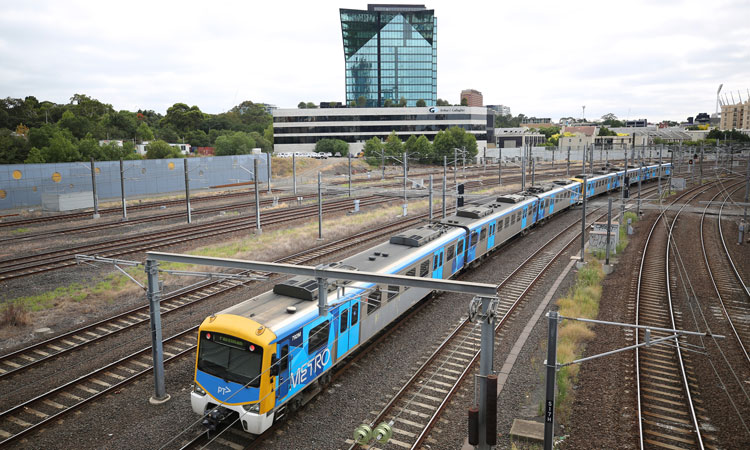

Metro Trains Melbourne moves more than 800,000 people every day on a network spanning more than 1,000km of track and 222 stations.
A sustainable transport system
The rail network in Melbourne is changing and expanding at an exciting rate. We are proudly partnering with the Government of Victoria to build an integrated, sustainable and safe transport system, backed by a major projects agenda, the likes of which our city has never seen before.
We are proudly partnering with the Government of Victoria to build an integrated, sustainable and safe transport system, backed by a major projects agenda, the likes of which our city has never seen before.
In 2019, we operated 650,000 safe and reliable services, with around 240 million passenger journeys. Patronage continues to grow with our population. We’re responding to this growth by carrying out more maintenance and renewal than ever before, with a record $12 million spent every week to maintain rail equipment, trains and technology.
Examples of maintenance and renewal include:
- Crews are working around the clock to extend station platforms, upgrade overhead electrical lines and maintain track and signalling
- Level crossings are becoming a thing of the past in Victoria; 35 level crossings are already gone and a total of 75 will be removed by 2025
- Construction of the Metro Tunnel is well underway, with twin underground rail tunnels being built between South Yarra and South Kensington, enabling us to run more services and take cars off the road
- The introduction of new state-of-the-art high-capacity Metro trains is well on track, giving passengers new levels of accessibility, information and capacity
- We are also investing heavily in passenger and employee safety thanks to the roll-out of new technology across the network – this includes the deployment of drones, a custom-built CCTV trailer, and upgrades to surveillance cameras.
These projects are all about keeping Melbourne moving.
Metro makes its mark globally
In a milestone moment in 2018, Metro became the world’s first rail operator to receive an operational infrastructure sustainability rating. The voluntary rating scheme, governed by the Infrastructure Sustainability Council of Australia (ISCA), measures and rewards sustainability performance. It looks at 15 categories, including procurement, climate change adaptation, energy and carbon, ecology and innovation.
In a milestone moment in 2018, Metro became the world’s first rail operator to receive an operational infrastructure sustainability rating.
In 2019, Metro saw an 11.5 point increase on the previous year’s score, with significant improvement across a number of areas, including water use, materials and innovation.
Also, for the first time, Metro scored 100 per cent in an ISCA framework category for community, health, well-being and safety.
Protecting our city’s rich biodiversity
Our network touches many local environments and communities bursting with rich biodiversity unique to our island nation. With a number of plant and animal species that are threatened with extinction living in some of these areas, we have a duty to protect them. To preserve our natural flora and fauna, Metro put in place a targeted Biodiversity Management Plan.
The plan outlines specific and targeted programmes of work to manage protected species in more than 30 biological sites of significance across the metropolitan network. Each site needs to be managed differently, with a specific set of ecological targets and a plan for improvement.
In 2020, we conducted our first ecological burns to promote the regeneration of indigenous flora and reduce the threat of weeds.
We’ve also invested in our hardworking teams of vegetation experts, who are out working on the network every day, ensuring that this critical work continues.
Energy savings
Rail transport is already one of the most efficient and sustainable transport modes, but we know that there is more work to do to improve our operational energy performance and reduce the reliance on grid electricity to power our trains, stations and maintenance depots. There is no doubt that this is a complex challenge. Passenger growth, additional services and new network infrastructure means that we will continue to see demand for electricity. So, our focus is on strategies to minimise our general electricity consumption. We look at every aspect of our operations for efficiency savings that can seem modest in isolation but add up to meaningful action.
We know that there is more work to do to improve our operational energy performance and reduce the reliance on grid electricity to power our trains, stations and maintenance depots.
Recently, we installed LED lighting on 136 train units, reducing energy consumption by 3,570 megawatt hours – enough to power around 714 Victorian homes for a full year. We have also retrofitted LED lighting at five rolling stock maintenance depots, reducing energy use by around 50 per cent.
We are currently commissioning the first wayside energy storage system (WESS) on our rail network, allowing energy to be recovered from braking trains. It acts as an ‘off-grid’ system – where otherwise wasted electricity is supplied back into the network.
These are important steps in reducing our carbon footprint and we’re continuing to pursue new opportunities and innovations in this space.
Sustainable use of resources
Transitioning to a circular economy is a key aspect of making sure Melbourne’s railway can operate sustainably for future generations.
In a first for Victoria’s public transport system, trains travelling through Richmond Station in the city’s inner east are running on railway sleepers made from recycled plastic. In June 2019, 190 composite sleepers, comprised of 85 per cent recycled plastic waste, were installed. The environmental benefits of using these sleepers are clear, as they reduce the need for timber resources and concrete production. If the trial is successful, the sleepers could be rolled out to other locations on the Metro network.
Transitioning to a circular economy is a key aspect of making sure Melbourne’s railway can operate sustainably for future generations.
Water scarcity is a worldwide issue, and Melbourne has experienced prolonged periods of dry conditions. That’s why Metro is playing an important role to maintain the security of our water supply. In 2019, we reduced water consumption across the rail network by 35 per cent, when compared to the previous year. This enormous effort has resulted in a water saving of 129 megalitres a year – enough to fill around 51 Olympic-size swimming pools. This was achieved through proactive water management measures, including the introduction of data loggers at sites with ageing infrastructure to enable a swifter response to water leaks.
Metro also conducted a water audit of 70 of Metro’s high-usage sites to identify efficiency opportunities.
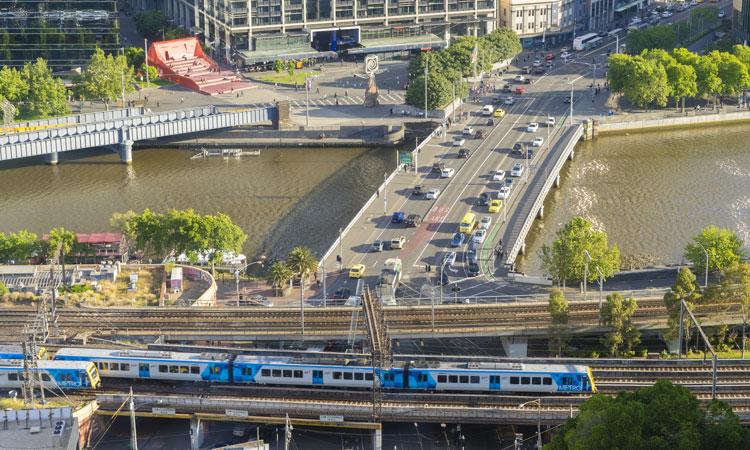

Metro’s ambitions are to contribute to a better city and help our people, passengers, partners and communities thrive.
Supporting the path to reconciliation
At Metro, we recognise that our trains move people through a landscape that holds the footprints and stories of thousands of generations of Aboriginal people. In 2019, Metro took a major step forward in supporting the national reconciliation movement to promote stronger relationships between Indigenous and non-Indigenous Australians.
Metro’s very first Reconciliation Action Plan (RAP) sets out ways that we can help to connect communities and enrich our city by building stronger relationships and creating opportunities with Aboriginal and Torres Strait Islander peoples. The three priority areas in the RAP are:
- Cultural responsiveness and engagement
- Economic and social inclusion
- Recognition and respect.
Having a RAP brings change to the way we work. Recently, our bio-site land managers joined with Wurundjeri Elders and Narrap Rangers to learn how traditional land management practices can improve biodiversity.
Getting people who face barriers to employment into work
Metro has a workforce of more than 6,100 people from all walks of life. As one of Victoria’s largest employers, our strength is in our diversity, and we work hard to ensure our team reflects the passengers we serve.
As one of Victoria’s largest employers, our strength is in our diversity, and we work hard to ensure our team reflects the passengers we serve.
Metro’s Socially Responsible Employment Program helps people who may otherwise face barriers to employment into meaningful jobs on the rail network. These include Aboriginal and Torres Strait Islander people, asylum seekers, retrenched automotive manufacturing workers, the long-term unemployed, people with a disability, refugees and young people. Since 1 July 2019, Metro has employed 44 candidates who have faced barriers to employment or come from an underrepresented group, with women making up more than 60 per cent of candidates.
An accessible network for everyone
Melbourne’s rail network belongs to everyone. That’s why we’re working harder than ever to improve the experience for passengers with accessibility needs.
In 2019, Metro became the largest transport provider to be awarded the Communication Access Symbol, meaning that all Metro frontline teams are now trained and equipped to assist passengers with communication difficulties.
We have seen the successful roll-out of new mechanical wheelchair pushers to some of our busiest stations.
Metro has also introduced new Assistance Animal Relief Areas for those travelling with Guide or Seeing Eye Dogs. These unique spaces give hardworking companions the opportunity to take a break and have a drink of water before continuing their journey on the network.
Metro has also supported the roll-out of new wayfinding beacons to some of Melbourne’s busiest stations, helping to improve the mobility of blind and visually-impaired passengers.
These initiatives are important in removing barriers to independent travel and supports equal access for all of our passengers.
The way forward
We can’t achieve our sustainability objectives without the thousands of Metro people who help to keep Melbourne moving every day.
Metro’s ambitions are to contribute to a better city and help our people, passengers, partners and communities thrive.
As Melbourne’s rail operator, we have a once-in-a-generation opportunity to support a more sustainable public transport network, and we are continuing to make significant progress to reduce our reliance on electricity, respond to the challenges of climate change and ensure the sustainable use of resources on the network.
We can’t achieve our sustainability objectives without the thousands of Metro people who help to keep Melbourne moving every day.
There’s more work to do, but we’re on the right track.
Related topics
Infrastructure Developments, Level Crossings, Operational Performance, Passenger Experience/Satisfaction, Regulation & Legislation, Rolling Stock Orders/Developments, Safety, Station Developments, Sustainability/Decarbonisation, The Workforce, Track Construction, Women in Rail





